Giochi dell'Oca e di percorso
(by Luigi Ciompi & Adrian Seville)
(by Luigi Ciompi & Adrian Seville)

|
Giochi dell'Oca e di percorso
(by Luigi Ciompi & Adrian Seville) |

|
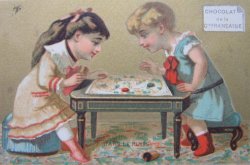 |
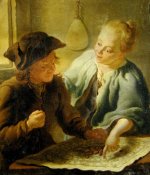
Torna alla ricerca giochi (back to game search) |
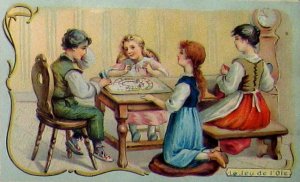 |
| Dictionnaire des Jeux, Pl.14 Poule de Henri IV, Tableau du Jeu Fig.14 | ||
 |
Versione stampabile
 |
Invia una segnalazione

|
 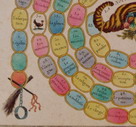 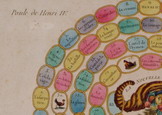 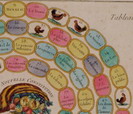 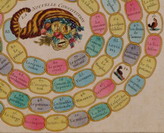 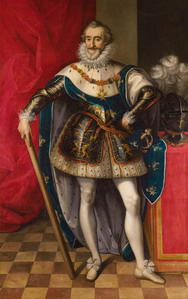 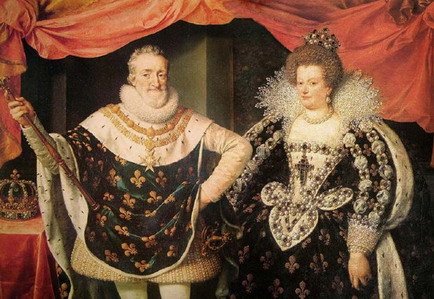 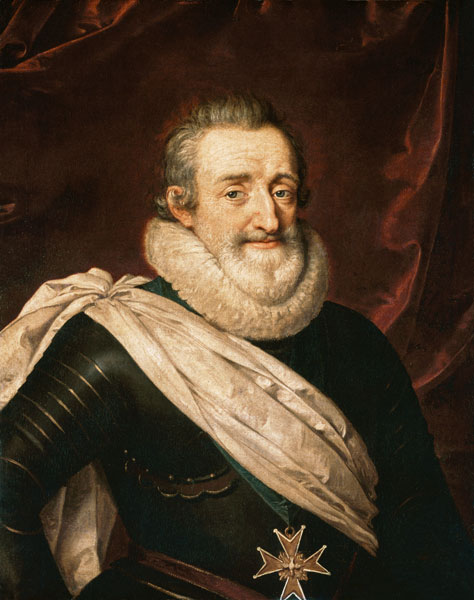 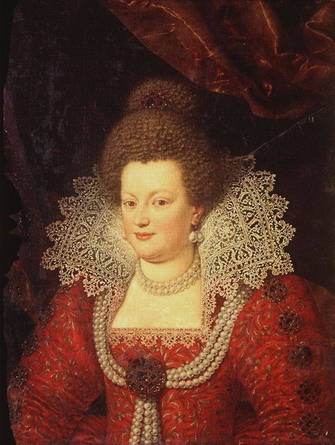 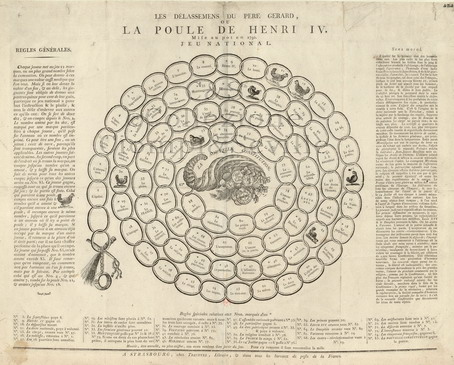 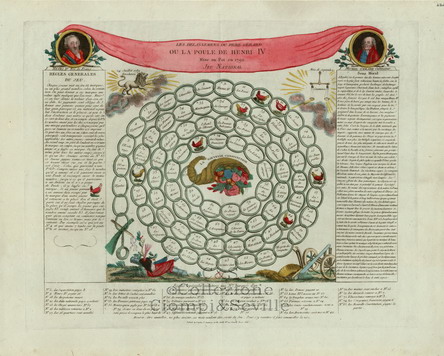 |
primo autore: | Non indicato |
| secondo autore: | Lacombe Jacques | |
| anno: | 1792 | |
| luogo: |
Francia-Parigi |
|
| periodo: | XVIII secolo (4°/4) | |
| percorso: | Percorso di 83 caselle numerate | |
| materiale: | carta (inserto) (paper) (papier) | |
| dimensioni: | 685X900 (230X349-213X330) | |
| stampa: | Acquaforte (taille-douce) (engraving) | |
| luogo acquisto: | Francia -Le Vesinet | |
| data acquisto: | 08-04-2019 | |
| dimensioni confezione: | Inserto di libro | |
| numero caselle: | 83 | |
| categoria: | Propaganda | |
| tipo di gioco: | Gioco di percorso | |
| editore: | Chez Panckoucke, Hotel de Thou, Rue des Poitevins, Parigi | |
| stampatore: | Chez Panckoucke, Hotel de Thou, Rue des Poitevins, Parigi | |
| proprietario: | Collezione Rothschild | |
| autore delle foto: | Waddesdon The Rothschild Collection (The National Trust) | |
| numero di catalogo: | 1178 | |
| descrizione: |
Gioco di 83 caselle in forma di catena spirale oraria. Al centro corno dell'abbondanza con monete (cornucopia). Tavola n°14 contenuta all'interno della pubblicazione: "Encyclopédie Méthodique- Dictionnaire des Jeux- Faisant suite au Tome III des Mathématiques. A Paris Chez Panckoucke, Hotel de Thou, Rue des Poitevins M.DCC.XCII". Vedi anche esemplare nella collezione Ciompi-Seville Arch. N°594 ed esemplari reimpostati Arch. N°2600. REGOLE: non riportate sul tavoliere. CASELLE: con didascalia. Cas. 1): L'égalité; Cas. 2): L'usurpation; Cas. 3): L'esclavage; Cas. 4): L'ignorance; Cas. 5): La superstition; Cas. 5): Les guerres civiles; Cas. 7): L'anarchie; Cas. 8): La cruauté; Cas. 9): HENRI IV; Cas. 10): La bonté; Cas. 11): poule; Cas. 12): poule; Cas. 13): La Societé; Cas. 14): La loi; Cas. 15): Le bien public; Cas. 16): poule; Cas. 17): La Trahison; Cas. 18): Le Despotisme; Cas. 19): Les petites maisons; Cas. 20): L'esprit des conquetes; Cas. 21): La dette nationale; Cas. 22): La misère; Cas. 23): Le tiers-Etat; Cas. 24): Les impots; Cas. 25): Le Clergé; Cas. 26): La noblesse; Cas. 27): Les seize quartiers; Cas. 28): L'intrigue; Cas. 29): Les ministres; Cas. 30): poule; Cas. 31): Les lettres de cachet; Cas. 32): La bastille; Cas. 33): Les fermiers généraux; Cas. 34): La banque-route; Cas. 35): MONTESQUIEU; Cas. 36): Le courage; Cas. 37): poule; Cas. 38): La philosophie; Cas. 39): VOLTAIRE; Cas. 40): La tolerance; Cas. 41): J. J. ROUSSEAU; Cas. 42): Les droits de l'homme; Cas. 43): La cocarde nationale; Cas. 44): poule; Cas. 45): La révolution; Cas. 46): MIRABEAU; Cas. 47): L'Assemblée Nationale; Cas. 48): Le patriotisme; Cas. 49): Le don patriotique; Cas. 50): La religion; Cas. 51): Le pouvoir legislatif; Cas. 52): LA FRANCE; Cas. 53): La gloire; Cas. 54): La fédération; Cas. 55): L'autel de la patrie; Cas. 56): Le 14 Juillet; Cas. 57): L'autel de l'hymen; Cas. 58): Le pouvoir judiciaire; Cas. 59): Les princes; Cas. 60): La dissimulation; Cas. 61): La vigilence; Cas. 62): La responsabilité; Cas. 63): LOUIS XVI; Cas. 64): Le Dauphin; Cas. 65): Varennes; Cas. 66): L'amour de la patrie; Cas. 67): L'acceptation; Cas. 68): Les contre-revolutionnairs; Cas. 69): Les aristocrates; Cas. 70): Les moines; Cas. 71): La discorde; Cas. 72): L'inconstance; Cas. 73): poule; Cas. 74): Les citoyennes françoises; Cas. 75): La concorde; Cas. 76): La Liberté; Cas. 77): La couronne civique; Cas. 78): L'amour du prochain; Cas. 79): Le pouvoir exécutif; Cas. 80): Le prince royal; Cas. 81): La régénération; Cas. 82): Le paradis; Cas. 83): La Nouvelle Constitution. NOTA: Vedi tavole della pubblicazione ("Encyclopédie Méthodique - Dictionnaire des Jeux) REFERENZA 1 Poule de Henri IV [plate 14 of the Dictionnaire des jeux]. Paris: chez Pancoucke, Hôtel de Thou, rue des Poitevins, 1792. Copper engraving, 22 × 34 cm. ; Girard/Quétel, pl. 46. This 83-space game is a leaf extracted from Jacques Lacombe’s Dictionnaire des Jeux (1792) (see Exhibit 15a). Rules are included in the body of the Dictionnaire rather than being present on the leaf. Neil MacGregor describes this game as being: a little propaganda for the constitutional monarchy, which continues the myth of Good King Henry, in whose footsteps Louis XVI, now disabused, is about to follow. The Dictionnaire des Jeux ... sets out the rules. In a chain with 83 links, one for each of the newly created Départements, you start with a Rousseau esque progression from Equality through Usurpation to Slavery. The geese are replaced by Henry IV’s “chicken in the pot” but the emphasis is predominantly ideological. If you land on Nobility, you go back to square one, Equality; if on Clergy, you advance with anti-celibate zest to the Altar of Marriage, and so forth. Landing on Voltaire, Rousseau or Mirabeau of course brings rapid progress and extraordinary pains are taken to explain the doctrine, crucial for the new Constitution, of the Separation of Powers: so, if you land on Montesquieu, you can move to the Legislature, or to the Judiciary, or indeed to the Executive. Unfortunately, by the time a diligent child had mastered such ideas, time had overtaken both them and the Constitutional Monarchy. MacGregor’s reference to time overtaking the constitutional monarchy refers to the fate of Louis XVI (1754–93). The monarchy was abolished just after publication of the Dictionnaire des jeux in 1792 and Louis was guillotined in the following year. Considering that Henry IV (1553 -1610) ruled over France from 1589, it is perhaps surprising that his memory was thought to have traction 200 years later in the fierce modernity of the Revolution, the more so since he was unpopular during his reign. However, after his death, he became more popular, being remembered as a monarch who had concerns for the welfare of his subjects. Indeed, he is reported to have said: “If God keeps me, I will make sure that no peasant in my realm will lack the means to have a chicken in the pot on Sunday!” To have chickens instead of geese on the favorable spaces is therefore highly appropriate, though their placement owes nothing to the classic game. The propitious theme of Henry IV’s reign was used much later to promote the Bourbon Restoration - see Game 43. (Adrian Seville) REFERENZA 2 "La Nuova Costituzione o La Gallina di Enrico IV" L'Autore del gioco ha inteso ricordare circostanze e avvenimenti della Rivoluzione francese. Prima di iniziare ciascuno versa un certo numero di gettoni per formare la puglia; quindi si srabilisce l'ordine del turno. Ogni giocatore deve avere un proprio contrassegno. Quando si capita su una gallina si avanza di tanti numeri quanti sono i punti sortiti, che vengono così raddoppiati; e se così facendo si finisce un'altra volta su una gallina, si ripetono ancora gli stessi punti.. Chi capita in una casella occupata torna al punto da cui era partito. Indipendentemente da queste due regole generali, ve ne sono altre particolari: Chi capita sul 5 peccando di superstizione deve versare alla puglia 3 gettoni; ma 16 ne vince chi capita sul 9 dov'è Enrico IV; chi vuol fare del dispotismo al numero 18 viene escluso dal gioco e per rientrare deve raddoppiare la posta iniziale. Al 21, debito nazionale bisogna versare alla puglia 6 gettoni; chi capita sul Clero (25) va al 57, altare dell'imene. Chi fa parte della nobiltà (26) perde tutti i punti fatti e torna alla casella 1, dell'eguaglianza; chi cade sulle caselle 27, 31 e 32, è soggetto alla stessa regola di chi capita al numero 18. Chi entra fra i ministri al numero 29, va ad occupare la casella 62 della responsabilità. Chi arriva al numero 33 versa 12 gettoni alla puglia e chi capita al 35 (Montesquieu) ha diritto di portarsi al 51, potere legislativo o, se il 51 è occupato, al 58, potere giudiziario; e se anche questo è occupato salta al 79, potere esecutivo. Nel caso in cui tutt'e tre i poteri fossero già in mano altrui, resta al 35. Chi è armato di coraggio (36) conquista la gloria (53). Ottiene la corona civica (77) chi giunge a Voltaire (39) o a Mirabeau (46). Se si arriva al 41 Rousseau, si va al 76 ov'è la libertà; se al 45, rivoluzione si va all'81, rigenerazione; l'Assemblea Nazionale (47) porta alla concordia (75); se si arriva al 48 patriottismo si ritirano dalla puglia 6 gettoni; 10 se ne pagano arrivando al 49 dono patriottico e ci si va a sacrificare sull'altare della patria (55). La religione (50) porta all'amor del prossimo (78); se si giunge al 52, casella della Francia, si va al 61, casella della vigilanza. Chi festeggia la commemorazione del 14 luglio (56), ritira 12 gettoni dalla puglia e va ad occupare il 66, amor di patria. Paga 10 gettoni chi incappa nei Principi al 59. Chi arriva al 63 casella del re Luigi XVI, va a prender posto al 67, accettazione; chi al 64, casella del Delfino, va all'80, casella del principe reale; chi al 65, Varennes, torna al 14 dov'è la legge. Torna al 19 chi va al 68 fra i contro-rivoluzionari; al 42 chi si fa aristocratico al 69; al 13 chi si fa monaco al 70. La discordia (71) fa precipitare nell'anarchia (7); l'incostanza (72) fa tornare alla schiavitù (3) e chi capita fra le cittadine francesi (74) riscuote 6 gettoni alla puglia. Chi infine arriva esattamente al numero 83 vince la puglia e la partita. Ma se supera quel numero retrocede di tanti posti quanti sono i punti sortiti in più e se retrocedendo capita su una gallina conta all'indietro ancora tanti punti quanti ne ha sortiti; dall'81, per esempio, traendo 12 si arriverebbe a 73; ma essendovi una gallina si retrocede ancora sino al 61. (Negri&Vercelloni) REFERENZA 3 This 83-space game is a sheet extracted from Jacques Lacombe’s Dictionnaire des Jeux (1792), which was a supplementary volume to Mathematics volume III of Pancoucke's Encyclopédie méthodique. Interestingly, there is evidence on the sheet that, just below the title at the top left, the original plate number has been scratched out (it was Fig. 14 in the Dictionnaire), presumably to conceal that it had been taken from a book. MacGregor (1977) describes this game as being: a little propaganda for the constitutional monarchy, which continues the myth of Good King Henry, in whose footsteps Louis XVI, now disabused, is about to follow. The Dictionnaire des Jeux... sets out the rules. In a chain with 83 links, one for each of the newly created Départements, you start with a Rousseauesque progression from Equality through Usurpation to Slavery. The geese are replaced by Henry IV’s ‘chicken in the pot’ but the emphasis is predominantly ideological. If you land on Nobility, you go back to square one, Equality; if on Clergy, you advance with anti-celibate zest to the Altar of Marriage, and so forth. Landing on Voltaire, Rousseau or Mirabeau of course brings rapid progress and extraordinary pains are taken to explain the doctrine, crucial for the new Constitution, of the Separation of Powers: so, if you land on Montesquieu, you can move to the Legislature, or to the Judiciary, or indeed to the Executive. Unfortunately, by the time a diligent child had mastered such ideas, time had overtaken both them and the Constitutional Monarchy. Interestingly, the propitious theme of Henry IV was used at a later date in a game (not in the Waddesdon collection) published by Basset in about 1815 to promote the Bourbon Restoration: here the favourable goose-type spaces were the Princes and Dukes of the new royal family. (Plock, Phillippa - Seville Adrian) REFERENZA 4 "Game of Henri IV's Chicken Taken from the Jacques Lacombe's 'Dictionnaire des Jeux' of 1792 (Poule de Henri IV Tableau du Jeu)", c. 1792. Unknown maker; etching and engraving on paper, hand-coloured in bodycolour. Waddesdon Manor, The Rothschild Collection (Rothschild Family Trust). This print of the game "Henri IV's chicken" was taken from the Dictionnaire de Jeux, 1792 by Jacques Lacombe. The plate number 14 has been erased - presumably so that it could have been sold separately. Henri IV (1553-1610) was revered as the good king and famously declared: 'If God spares me, I will ensure that there is no working man in my kingdom who does not have the means to have a chicken in the pot every Sunday'. The game promotes revolutionary ideals by making Voltaire, Rousseau and Mirabeau illustrate beneficial squares. Landing on squares illustrating the nobility sends the player back to the beginning. This game may have served as propaganda for the constitutional monarchy of 1791, by associating it with the benevolence of Henri IV. (Jacobs Rachel) Exhibitions - "Playing, Learning, Flirting: Printed Board Games from 18th-Century France". Catalogue exhibition of French eighteenth-century Board Games, 28 March – 28 October 2012, Waddesdon Manor, The Rothschild Collection (Rothschild Family Trust). Rachel Jacobs, Curator. |
|
| bibliografia: |
1) D’ALEMBERT et alii: "Encyclopédie Methodique Mathematiques" con "Dictionnaire de Jeux", Ed. Panckoucke e Agasse, (pagg. 236-9), Parigi 1792. 2) D’ALLEMAGNE,H. R. : "Le Noble Jeu de l’Oie", Paris, Libraire Gruend, 1950. 3) NEGRI, Ilio - VERCELLONI, Virgilio: "I giochi di dadi d'azzardo e di passatempo dei gentiluomini e dei pirati". Introduzione di Caterina Santoro, Lerici Milano 1958. 4) TUCOO-CHALA, Suzanne: "Charles-Joseph Panckoucke et la Librairie Française", 1736-1798, Pau-Paris, éd. Jean Touzot, 1977. 5) MASCHERONI, Silvia - TINTI, Bianca: “Il gioco dell’oca: un libro da leggere, da guardare, da giocare”. Ed. Bompiani, Milano 1981. 6) GIRARD, Alain R. - QUETEL, Claude: "L’histoire de France racontée par le jeu de l’oie", Ed. Balland-Massin Parigi 1982. 7) REICHARDT, Rolf: "Das Revolutionsspiel von 1791", Insel Verlag, Nomos Verlagsgesellschaft, Baden-Baden 1989. 8) BRAUNROT, Christabel P. - HARDESTY DOIG, Kathleen: "The publication of the Encyclopédie méthodique", no 327, Studies on Voltaire and the Encyclopédie, Oxford, Voltaire Foundation, 1995, p. 5-152. 9) PLOCK, Phillippa - SEVILLE, Adrian: "The Rothschild Collection of printed board games at Waddesdon Manor", in XIIIth Board Game Studies Colloquium, Paris, 14-17 April 2010. 10) GROULT, Martine: "Savoir et matières. Pensée scientifique et théorie de la connaissance de l'Encyclopédie à l'Encyclopédie méthodique", Paris, CNRS Editions, 2011 (ISBN 978-2-271-07195-8). 11) JACOBS, Rachel: "Playing, Learning, Flirting: Printed Board Games from 18th-Century France". Catalogue exhibition of French eighteenth-century Board Games, 28 March – 28 October 2012, Waddesdon Manor, The Rothschild Collection (Rothschild Family Trust). Rachel Jacobs, Curator. 12) HARDESTY DOIG, Kathleen: "From Encyclopédie to Encyclopédie méthodique revision and expansion", Oxford, Voltaire Foundation, 2013 (ISBN 978-0729410779). 13) SEVILLE, Adrian: "The Royal Game of the Goose four hundred years of printed Board Games". Catalogue of an Exhibition at the Grolier Club, February 23 - May 14, 2016. 14) SCHMITT, Stéphane: "Inventaire des livraisons, des auteurs et du contenu de l’Encyclopédie méthodique (1782-1832), Recherches sur Diderot et sur l'Encyclopédie, 2018, n° 53, p. 207-272. |
|
| Encyclopédie méthodique | ||
| Accession N°2669.1.24 Waddesdon-The Rothschild Collection | ||
Vai alla ricerca giochi Vai all'elenco autori